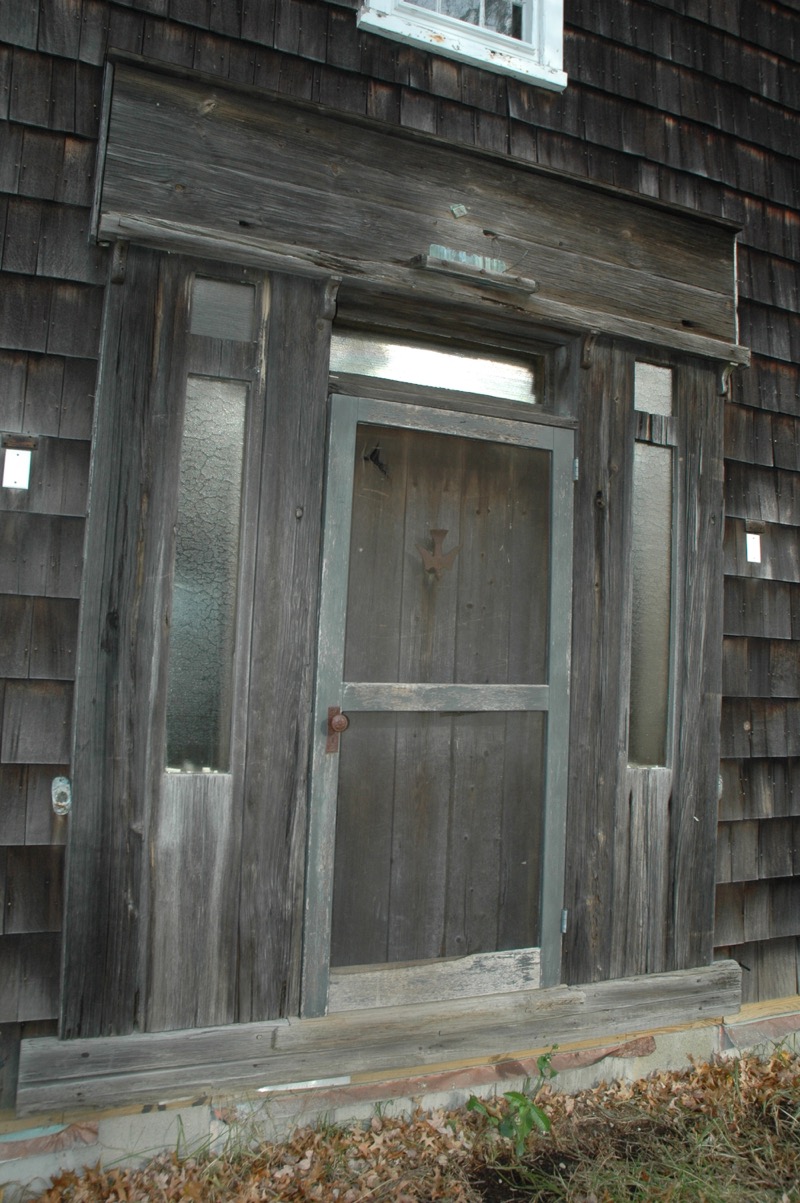
[caption id="attachment_57832" align="alignright" width="387"] The door in question at the Point House in North Haven. Stephen J. Kotz photo[/caption]
The door in question at the Point House in North Haven. Stephen J. Kotz photo[/caption]
Stephen J. Kotz
There are hints this week of a thaw, however tentative, between Stuart Hersch, the owner of the Point House, and North Haven Village officials over his plans for the historic structure.
On Wednesday, December 7, Mr. Hersch via email said he is still willing to work with the village to undertake a modest restoration of the 1804 landmark. He said, though, that he wanted village officials to reduce his property taxes, reimburse him for a portion of the taxes he had already paid, and cover the costs of preparing plans for the work.
Mayor Jeff Sander, who at a Tuesday, December 6, village board meeting said he was still waiting to hear from Mr. Hersch about his plans, responded in an email of his own that he believed a solution could be reached.
Mr. Hersch, the president and chief executive officer of Cantor Fitzgerald, purchased the 2.6-acre property at the corner of Ferry and Fahys roads from the model Christie Brinkley in 2013 for $10 million. He wanted to replace the Colonial-era Point House, which once overlooked Sag Harbor, with a new house, but agreed with the village’s request to move the Point House to a new site on the property facing Ferry Road for possible use as a guest house.
The house was moved to a new foundation in 2014, but has sat vacant ever since, its interior gutted and some windows open to the elements.
After Mr. Sander expressed concern about the home’s future and Mr. Hersch’s intentions for it at the North Haven Village Board meeting in November, Mr. Hersch responded that he had already invested approximately $200,000 in preserving the house. He said he would renovate the exterior of the house as he saw fit, but was unwilling to do the more extensive project he said village officials were asking of him. He threatened to let the building deteriorate to the point it would have to be torn down if the village did not meet his demands.
Mr. Sander, in turn, said Mr. Hersch had never submitted any plans for a renovation project, so the village was in no position to say whether it would be satisfactory or not.
Last summer, the village hired Zach Studenroth, a historic preservation consultant, to weigh on what should be done to protect the house, but Mr. Hersch rejected those suggestions as excessively expensive.
This week, Mr. Hersch by email said the Point House had originally been appraised by Southampton Town after being moved to its new location at $825,683, but that the town later reduced that appraisal to $106,300, saving him $4,846 in town taxes this year.
He said he wanted to be reimbursed for the $4,846 in extra taxes he paid last year as well as have his village tax bill, currently about $4,000 for the house, reduced as well.
In addition, he said he wanted the village to waive permit fees and either pay for building plans or agree to a restoration that would replace the front door with one that is “period appropriate” — he cited the Sag Harbor Custom House as an example — and allow him to put in energy-efficient windows. Mr. Hersch said he was open to discussing the removal of rooftop skylights.
Mr. Studenroth’s report called for the preservation of the exterior windows, which he cited as historic. The consultant suggested Mr. Hersch could install interior-mounted windows if he was concerned about energy efficiency. Mr. Studenroth’s report also called for the repair-in kind of cedar shingles as well as the restoration of the front door and trim.
Mr. Hersch said he was committed to “work to come up with a reasonable and mutually agreeable solution,” but added, “I do not take kindly to threats or attempts to intimidate me.”
Mayor Sander this week conceded that Mr. Hersch held the upper hand. Unlike Sag Harbor Village, North Haven does not have a historic district, and the Point House has never been designated an official landmark. The mayor said when the village gave Mr. Hersch a variance allowing him to have two houses on his property, it did not insist on covenants restricting what he could do with the house.